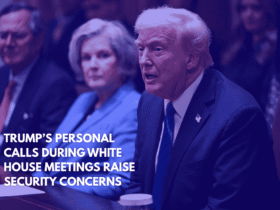Top U.S. officials have reported significant progress in high-level trade negotiations with China, hinting at the possibility of a deal that could have major implications for the global economy.
After two days of talks in Geneva, Switzerland, Treasury Secretary Scott Bessent and U.S. Trade Representative Jamieson Greer indicated that a breakthrough may have been reached.
U.S. Officials Confirm Substantial Progress
“We’ve made substantial progress between the United States and China in the very important trade talks,” Bessent said in a brief statement on Sunday. He described the discussions as “productive,” signaling that both sides may have come to a resolution on key trade issues.
Greer, who also spoke on the matter, expressed confidence in the deal, noting that the quick agreement reflected that the differences between the two countries may not have been as vast as initially thought.
His remarks came after President Donald Trump imposed steep tariffs on Chinese goods, which prompted a retaliatory move by China.
“We’re confident that the deal we struck with our Chinese partners will help us resolve the national emergency,” Greer said, referring to the tariffs and the economic strain they’ve caused.
The Details of the Deal and Next Steps
While the exact details of the trade agreement have not yet been released, officials from both countries have confirmed that they are working on finalizing the details and plan to issue a joint statement on May 12.
Chinese Vice Premier He Lifeng echoed the positive sentiment, calling the talks “candid, in-depth, and constructive” and stating that both sides have agreed to establish a “trade consultation mechanism.”
In addition to the trade talks, there has been mention of further consultations and the potential to finalize the details soon. This indicates that the agreement could be a significant step toward de-escalating tensions and restoring trade relations between the two largest economies in the world.
Impact of the Trade War on the U.S. and China
The ongoing trade war between the U.S. and China has already had notable impacts on both economies. U.S. imports from China have dropped significantly, with shipments falling by 60% due to the tariffs imposed.
In turn, Chinese exports to the U.S. also saw a dramatic decline in April, with exports dropping 21% compared to the same time last year.
Economists have warned that reducing tariffs by even 50% might not be enough to restore trade to previous levels, but it could be a crucial first step in alleviating some of the economic pressure caused by the tariffs. With inflation rates expected to rise by 4% by the end of the year, largely due to the trade war, it’s clear that the stakes are high for both nations.
A Global Economic Ripple Effect
As the world’s two largest economies, the U.S. and China’s trade relations have a ripple effect on the global market. Imports of Chinese goods, such as electronics, textiles, and various consumer products, have become integral to the U.S. economy.
But with tariffs now in place, U.S. businesses have felt the strain, as costs on imported goods have surged, passing the burden to American consumers.
The decline in trade, particularly with China, is expected to impact the broader global market as well. According to the National Retail Federation, U.S. imports are expected to fall at least 20% year-over-year in the second half of 2025, with the decline in imports from China anticipated to be much more severe.
China’s Economic Struggles
China has also felt the pressure from the trade war, particularly in its manufacturing sector, which contracted at its fastest rate in over a year in April. The sharp decline in exports to the U.S. has added urgency to Beijing’s efforts to stimulate its own economy through fresh economic policies.
Despite these economic challenges, both the U.S. and China are working toward finding a resolution that can help stabilize their economies and restore trade flows.
The Role of Hong Kong’s Jimmy Lai in Negotiations
Amid the trade talks, President Trump also mentioned his intention to raise the issue of jailed Hong Kong media tycoon Jimmy Lai, whose national security trial has drawn international attention.
Lai, a former publisher of the pro-democracy tabloid Apple Daily, faces a life sentence under Hong Kong’s national security law. Trump has indicated that he would bring up Lai’s case during the negotiations, though it is unclear whether this issue was formally discussed with Chinese officials during the talks in Geneva.
The Path Ahead
The trade discussions between the U.S. and China are ongoing, and while substantial progress has been made, it remains to be seen how the details will play out. Both sides have indicated that they are committed to finalizing a deal that can lead to de-escalation and restore normal trade relations.
The global economy is watching closely as the two superpowers negotiate, hoping that the agreement, if finalized, can bring much-needed stability to international trade.











Leave a Reply